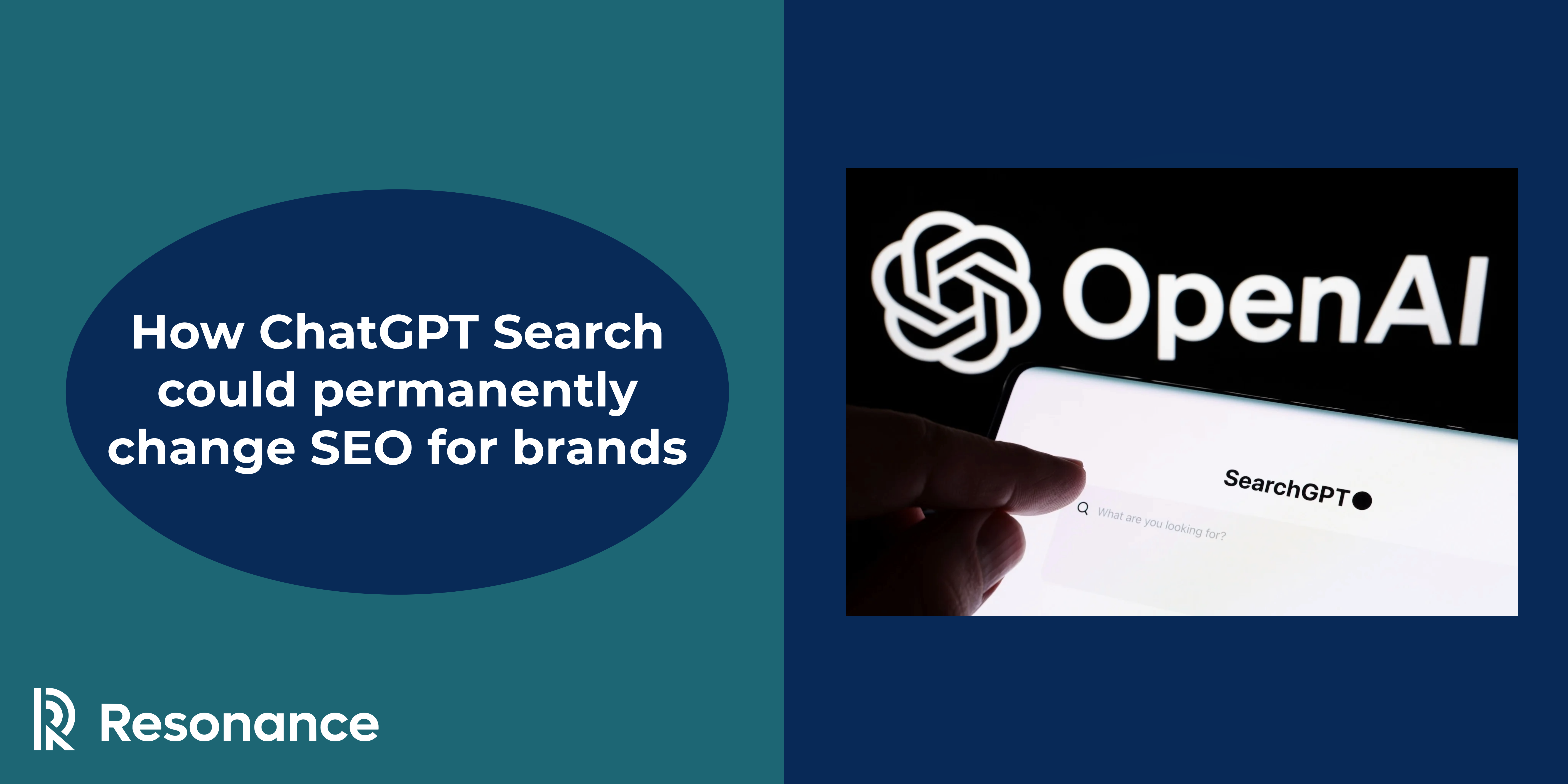On 31st October, OpenAI rolled out a much-anticipated new feature to ChatGPT – ChatGPT Search. If it gains traction – a big if given Google’s dominance – it could have massive implications for brands across consumer and b2b. Why? Because somewhere between 40% and 90% of buying journeys start with a Google Search. Change that and we need to rethink organic search from the ground up.
Searching with ChatGPT– the elephant in the room
Ever since ChatGPT launched on 30th November 2022, the elephant in the room has been search. Of course, it was great at generating content since day 1, but it also gave us useful information - recipes, travel planning, gift ideas. “Hacks” that have come to be pretty handy over time. It’s also the type of information we previously plugged into Google. ChatGPT gave us a much better user experience to gather information like this – in fact, it felt like a glimpse into the future of search.
ChatGPT’s potential for search was not lost on Google. It caused the company to scramble to come up with a response, placing it under a “Code Red” state of emergency overseen by Google’s original founders Larry Page and Sergey Brin. It led to the rapid, perhaps rushed, introduction of “AI Overviews” to search, and the company accelerated development of rival LLMs to ChatGPT under Google Gemini.
OpenAI didn’t hide the fact it had search in mind for its flagship product, but it was only in July 2024 that it announced its SearchGPT prototype which rolled out to a small group of beta testers.
Introducing ChatGPT Search – its version of search
OpenAI has now introduced ChatGPT Search, enhancing ChatGPT's capabilities by integrating real-time web search functionality to its paid version.
The feature allows us to receive up-to-date information, including current events, sports scores, and stock prices, directly within ChatGPT interactions.
Most importantly, responses now include links to relevant sources, giving us the ability to explore topics further – and therefore acting as a gateway to the rest of the internet … just like search.
And so it opens up a new type of SEO, I can now use search to, for instance, search for B2B tech PR support in London and gain a list of useful responses:


The question is how do I rank on ChatGPT Search?
How do I improve my SERP position on ChatGPT Search?
Chatbot-based search still returns a result “page”, so SERP (search engine results page) is still relevant as a term – even if the format of the results is completely different. And behind the scenes, OpenAI hasn’t changed the basics of search significantly, at least not yet.
That’s because ChatGPT Search uses Bing. OpenAI says in its help section that “to provide relevant responses to your questions, ChatGPT searches based on your prompts and may share disassociated search queries with third-party search providers such as Bing,” – so it is clear that a high ranking on Bing will get you listed on ChatGPT Search, albeit via the US version of Bing (so there’s a bias towards US results).
But there are some important considerations. Top of the list is that ChatGPT replies with a generative response blended from a only the top 12 search results. Therefore, in order to be referenced as a source, you need to be a top 12 response or you’re not considered.
This requirement to be in the top 12 results is compounded by the fact you cannot simply ask for more responses as if you were going to the next page of Google. Each ChatGPT interaction is a new query, it will just generate a variation of the original list.
For a brand this means the options are to either double down on getting in the top 12 for a key term/phrase, and use SEO strategies like building a 10x pillar page to outrank your rivals, or to focus on other key phrases.
With ChatGPT Search you have to choose your battles, and be prepared to invest time and effort in creating high quality content to be rewarded.
At the moment a secondary challenge to improving your search ranking in ChatGPT Search is that tools to track ChatGPT Search haven’t been built – at least not yet, although tracking ranking in Bing is a good proxy.
How will ChatGPT Search Work in the Future?
This is where it gets interesting. As I’m sure you know, search engines rely on webcrawlers, bots that explore the internet, working out the relationships between pages, and harvesting content to work out how important and relevant each web page on the internet is.
ChatGPT has its own crawlers. Since August 2023, it has (controversially) been using has been using the GPTBot Web Crawler to gather data from the web to train its large language models.
But more recently, in September 2024, it introduced its own search bot, the “OAI-SearchBot.” The description on OpenAI’s bots page says “OAI-SearchBot is used to link to and surface websites in search results in the SearchGPT prototype, and OpenAI search features.”
This suggests OpenAI is going a step further and will soon serve search results from its own crawlers without relying on Bing.
It opens up the possibility that search will no longer use a variation of PageRank at its core, the algorithm that has been the basis of search for 25+ years.
Conclusion – Focus on your ranking now to succeed in the future of ChatGPT Search
As ChatGPT Search gains momentum, the competitive landscape for SEO is changing.
At some point search will flip from the current 30-year-old format of webpage links, and move into the generative style of results, where your appearance in a result will depend on you being referenced in the text (i.e. a top 12 result).
To prepare for the future, brands should work on creating high-quality, informative, original content that resonates with search algorithms, and consider strategies to rise up the rankings for important keywords and key phrases.
Preparing for these changes now is the key to future-proofing your digital presence.



 "The intricacies of the data-driven landscape is written into the DNA of Resonance. We are built for the data economy."
"The intricacies of the data-driven landscape is written into the DNA of Resonance. We are built for the data economy.".jpeg?width=250&height=181&name=AdobeStock_565367297%20(1).jpeg)
 "In Tech PR we have a front row seat to the changing technology landscape. From Generative AI to Quantum, it's our job to insert our clients' voices into the narrative"
"In Tech PR we have a front row seat to the changing technology landscape. From Generative AI to Quantum, it's our job to insert our clients' voices into the narrative"



 "In a world where the only constant is change, how do tech brands stay one step ahead of the market? That's where Resonance comes in"
"In a world where the only constant is change, how do tech brands stay one step ahead of the market? That's where Resonance comes in".png?width=219&height=219&name=Seb%20Moss%20wavelength%20thumbnail%20(1).png)

 "Resonance is a group of technology, business and communications experts"
"Resonance is a group of technology, business and communications experts"


 Tom Fry
Tom Fry
